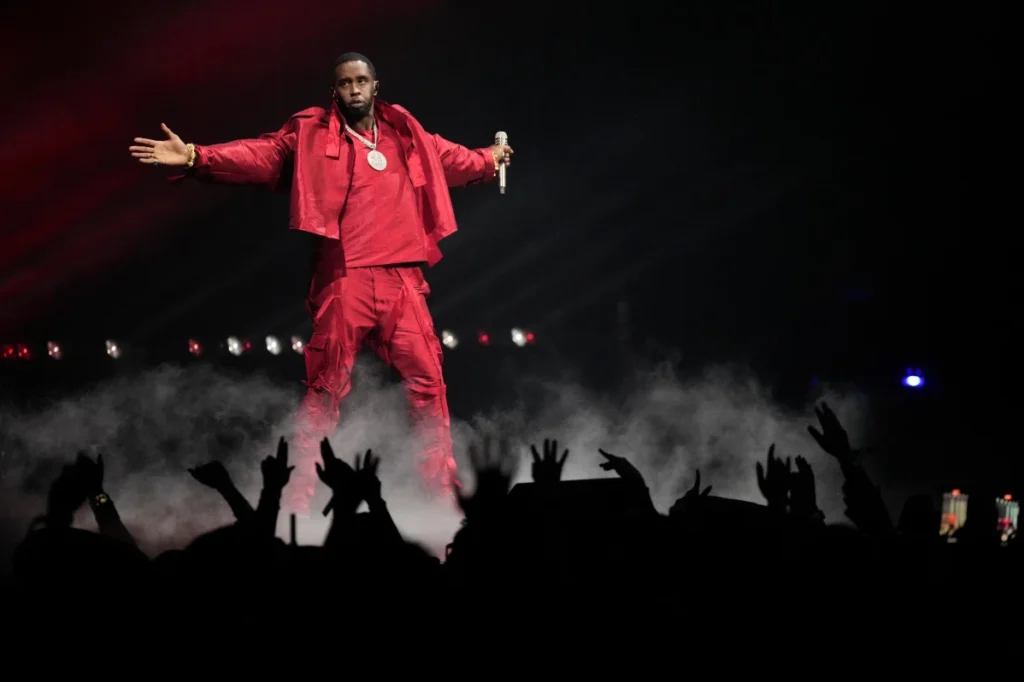
By Nwanze A. Moses – Controller/Manager J.O COMMS
New York City — October 6, 2025
For more than two decades, Sean “Diddy” Combs reigned as one of hip-hop’s most influential powerhouses — a mogul who transformed beats into billions and swagger into an empire. From launching chart-topping artists to founding fashion labels and liquor brands, Diddy embodied the fusion of artistry and ambition that defined an era.
But on Friday, a federal judge sentenced the 55-year-old music impresario to four years and two months in prison, marking a dramatic downfall for a man once hailed as the ultimate hustler in hip-hop’s golden age.
The sentence followed Combs’ conviction in July 2025 on charges of transporting people across state lines to engage in prostitution — a lesser charge compared to the racketeering and sex trafficking counts on which he was acquitted. Still, the verdict capped a stunning collapse of a once-untouchable celebrity whose brand was built on luxury, power, and excess.
The Making of a Mogul (1990–1999)
Born in Harlem and raised in Mount Vernon, New York, Sean Combs’ ascent began humbly as a Howard University student interning at Uptown Records in 1990. His drive was magnetic — by 1993, after being fired from Uptown, he founded Bad Boy Records, striking a lucrative partnership with Arista Records and launching the careers of The Notorious B.I.G., Mary J. Blige, and Faith Evans.
Yet controversy shadowed his success. In 1991, nine people were killed at a celebrity basketball game he co-promoted in New York — an early sign of the chaos that often trailed him. In 1997, after Biggie’s murder, Combs immortalized his friend with the global hit “I’ll Be Missing You,” a song that earned him one of two Grammys that year and cemented his superstardom.
Reinvention and Rebellion (2001–2008)
By the early 2000s, Combs — now known as P. Diddy — was reinventing himself again. He starred in MTV’s Making the Band, performed at the Super Bowl halftime show, and even made his Broadway debut in A Raisin in the Sun. But legal scuffles persisted.
A 2001 nightclub shooting trial nearly derailed his career. Though acquitted, the incident — which sent rapper Shyne to prison — deepened Diddy’s reputation as hip-hop’s comeback king who thrived on chaos.
In 2008, Hollywood finally recognized his cultural impact with a star on the Walk of Fame, crowning a decade of influence and reinvention.
The Business of Power (2015–2022)
As the music faded, Diddy the businessman flourished. He launched a charter school in Harlem, donated to Howard University, and was crowned Forbes’ highest-paid celebrity in 2017, earning $130 million that year.
But tragedy struck in 2018 with the death of Kim Porter, the mother of three of his children. Behind the lavish parties and designer suits, insiders described a man growing increasingly erratic — a trait that would later become central to the allegations against him.
Scandal and Collapse (2023–2025)
The first public crack appeared in November 2023, when singer Cassie Ventura, his longtime girlfriend, sued him for rape and abuse. The case was settled within a day, but it unleashed a flood of lawsuits from other accusers — both women and men — describing a network of coercion, manipulation, and sexual violence spanning decades.
Federal agents raided Combs’ homes in Los Angeles and Miami Beach in March 2024, seizing electronics and documents. Two months later, CNN aired hotel surveillance footage showing Combs violently assaulting Cassie in 2016 — a video that shocked even longtime fans.
By September 2024, Combs was under federal indictment for sex trafficking and racketeering, accused of using his business empire to exploit women through what prosecutors described as “drug-fueled coercion and control.”
During his trial in May 2025, jurors heard harrowing testimony from two ex-girlfriends who alleged they were forced into sex marathons under the influence of drugs and threats. While the jury cleared him of the most serious charges, they found him guilty of prostitution-related offenses.
A Legacy Rewritten
At sentencing, Judge Laura Benton called the case “a sobering reminder that fame and fortune do not erase accountability.” Combs, wearing a gray suit and cuffed hands, apologized to “those I’ve hurt,” though he continued to insist the encounters were consensual.
Once celebrated as a visionary who embodied hip-hop’s entrepreneurial spirit, Sean “Diddy” Combs now begins a new chapter — not as a mogul or a hitmaker, but as an inmate.
His story, a cautionary saga of ambition, power, and downfall, leaves a once-mighty empire in ruins and a legacy forever shadowed by scandal.
